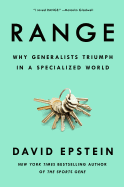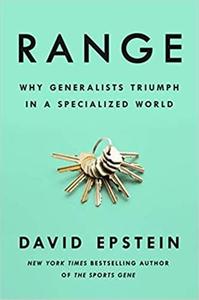
 In the 21st-century world of 24/7 cable news and the Internet, there's no opinion lacking a highly credentialed expert to advance it. David Epstein's well-researched, lively Range: Why Generalists Triumph in a Specialized World sounds a note of caution when it comes to the credulous acceptance of these oracular pronouncements. Instead, Epstein makes a persuasive case for the "advantages of breadth and delayed specialization" in shaping better leaders and problem solvers in a complex world.
In the 21st-century world of 24/7 cable news and the Internet, there's no opinion lacking a highly credentialed expert to advance it. David Epstein's well-researched, lively Range: Why Generalists Triumph in a Specialized World sounds a note of caution when it comes to the credulous acceptance of these oracular pronouncements. Instead, Epstein makes a persuasive case for the "advantages of breadth and delayed specialization" in shaping better leaders and problem solvers in a complex world.
Epstein (The Sports Gene: Inside the Science of Extraordinary Athletic Performance) distinguishes between "kind" learning environments (like golf or chess, where intensive, repetitive practice yields immediate feedback and ultimately can lead to mastery) and "wicked" ones (like medicine or firefighting, where problems shift shape, and experience, paradoxically, often "will reinforce the exact wrong lessons." He then argues that the pressure toward hyper-specialization in many fields is counterproductive and, at times, even dangerous.
Using his own life as a starting point (he detoured from a career in environmental science to work as an investigative journalist for Pro Publica and write for Sports Illustrated), Epstein also offers a plethora of examples to support his thesis that "modern life requires range, making connections across far-flung domains and ideas." To nurture the talents of people best able to achieve that goal, he advocates passionately against early specialization and for the idea of "match quality." It's a term he borrows from the discipline of economics, where it's used to describe the congruence "between the work someone does and who they are." As he explains, the search for that match is the defining characteristic in the lives of successful late starters like Vincent Van Gogh or 102-year-old Frances Hesselbein, who took her first professional job at age 54 and now heads a leadership institute that bears her name, after retiring from her much-admired tenure as CEO of the Girl Scouts of America.
Epstein presents a host of fascinating case studies, both cautionary and inspiring, to illustrate the limitations of narrowly specialized expertise. The space shuttle Challenger disaster in January 1986 demonstrates the flaws of a quantitative culture that discarded the warnings of engineers who couldn't support their fears of a catastrophic accident with hard data. A brief biography of Gunpei Yokoi, the "tinkerer" responsible for creating products like the Nintendo Game Boy by "putting cheap, simple technology to use in ways no one else considered" is nothing short of astonishing. And a chapter on how and why expert predictions miss the mark should induce caution the next time a financial wizard predicts a stock market boom or bust. But Range by no means is a brief for ignorance or for the validation of ill-informed guesswork. Rather, Epstein offers an exhilarating vision of how smart, curious people can more skillfully apply their best thinking to change and improve the world. --Harvey Freedenberg, freelance reviewer
Shelf Talker: Journalist David Epstein makes the case for breadth over depth when it comes to training people to solve complex problems.

